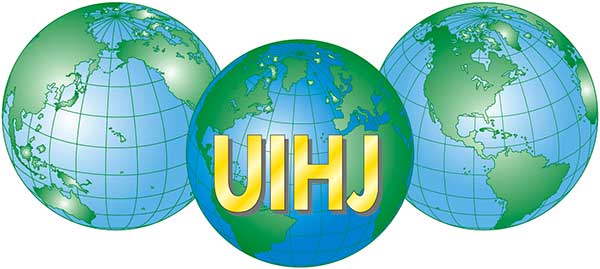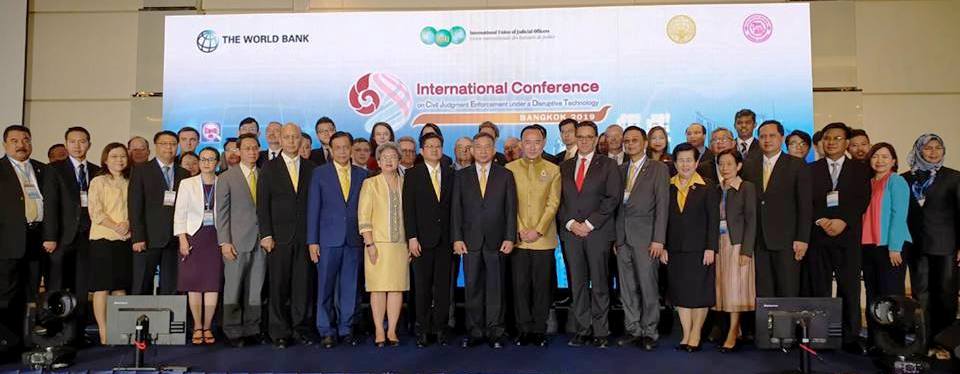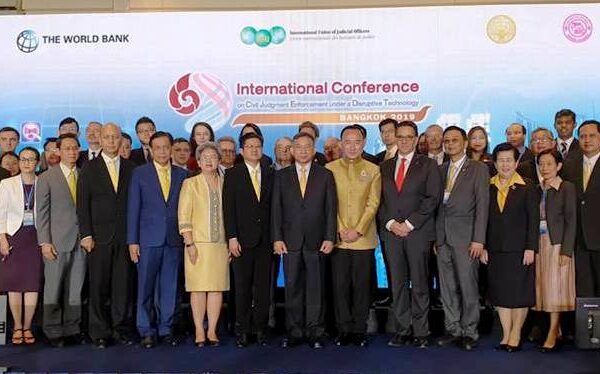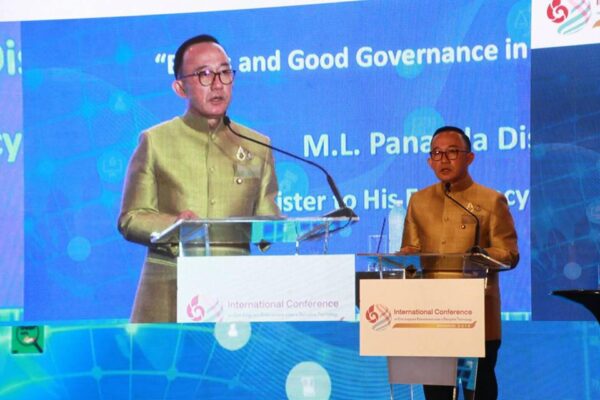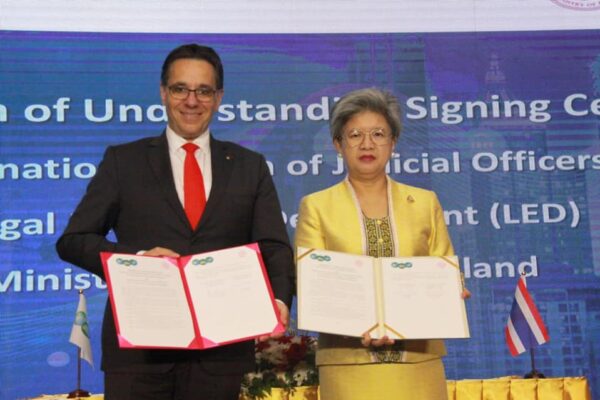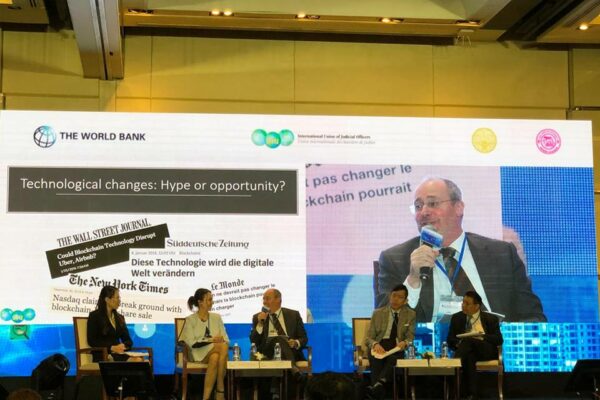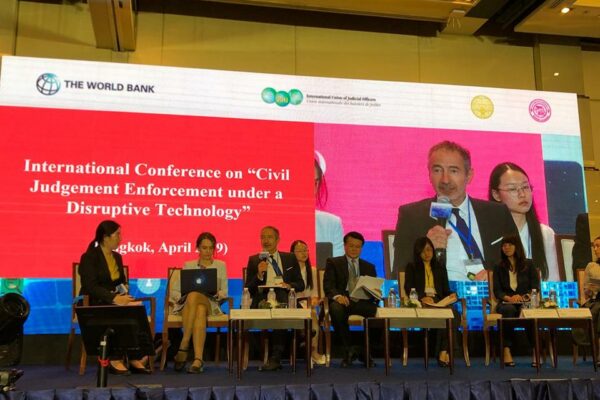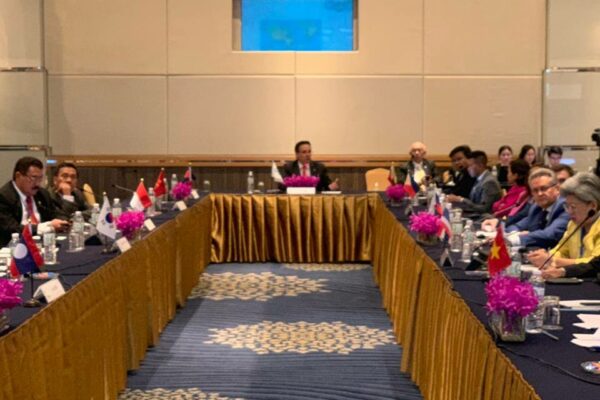From April 24-26, 2019, the Legal Execution Department of the Ministry of Justice of the Kingdom of Thailand hosted the international Conference on Civil Judgment enforcement under a disruptive technology.
The conference aimed to advance the knowledge concerning civil enforcement with an aim to improve legal frameworks and real practices and the impact of modern technologies on the way civil enforcement is carried out.
UIHJ was represented by several of its board members: Marc Schmitz (president of UIHJ), Luis Ignacio Ortega Alcubierre (vice president of UIHJ), Jos Uitdehaag (secretary of UIHJ) and Ruenvadee Suwanmongkol and Patrick Safar (board members).
Besides UIHJ and the World Bank, over 400 delegates from Thailand, Cambodia, People’s Republic of China, Indonesia, Japan, the Republic of Korea, People’s Democratic Republic of Laos, Malaysia, Myanmar, Philippines, the Russian Federation and Vietnam participated.
The Conference was opened by ACM Prajin Juntong, deputy prime minister of the Kingdom of Thailand and Justice Minister, professor Wisit Wisitsora-at, permanent secretary of the Ministry of Justice and Ms. Ruenvadee Suwanmongkol, director-General of the Legal Enforcement Department of the Ministry of Justice of Thailand and member of the Board of UIHJ.
It is without saying that there are rapid changes in technology that have its impact on enforcement, the way enforcement is performed and the protection of the rights of both creditors and debtors in the modern enforcement procedure.
Introduction to the three workshops was given by Mr. Sarawut Benjakul, secretary-general of the Office of Judiciary, Mr. Marc Schmitz, president of UIHJ and Mr. M.L. Panadda Diskul, assistant minister to the prime-minister of Thailand.
In 3 workshops, the conference paid attention to the influence of technological changes in the field of enforcement:
Workshop (1) on the enforcement of digital assets paid attention on the way digital assets can be enforced. Though, besides physical assets, digital assets become more and more common in day to day life, it seems that legislation in the field of enforcement has hardly been developed. Though most jurisdictions have formally recognized the existence of digital assets, the enforcement of such assets remains controversial.
Workshop (2) digital transformation – digital enforcement process and (3) technological challenges in civil enforcement. Digital technology has changed the life of citizens. Digital technology also changes the organization of enforcement: nowadays it is utilized in order to facilitate the access of parties to the procedure and to improve case management. From the presentations it became obvious that the technological changes improved/ transformed the traditional enforcement process towards digital-based procedures.
Workshop (3) Technological challenges in Civil Enforcement. The rapid technological changes have its influence on enforcement. It also means an active role of enforcement authorities: enforcement processes need to be modernized and thus corresponding reforms are necessary. Here also other aspects play a role, such as data protection and information security.
In all, the conclusion is that the rapid changes in technology have its influence on the perception of enforcement. More than in the past a dynamic, active, role for enforcement authorities and Government is necessary. Very quickly, there is a threat that legislation will not be able to catch up and address technological changes. It will demand a changing mindset: typical for technologic changes is that they are not bounded by geographical borders. It is a task of the enforcement agent to safeguard the interests of the parties in such environment.
During the conference, the Legal Execution Department and UIHJ also signed the Memorandum of Understanding to further strengthen the academic cooperation in the field of civil enforcement. This means, among others:
• The exchange of academic information and experience on improvement and development of civil judgment enforcement systems.
• The exchange of academic information and experience on issues of legal support of judicial officers’ activity, monitoring law implementation and the improvement of legal regulation(s) in the sphere of civil judgment enforcement.
• The exchange of experience on issues of technical support (including software
and computing) of functions’ civil judgment enforcement.
• The exchange of academic information and experience relating to their activities in teaching and training in the field of civil judgment enforcement.
• The exchange of officers and legal expert for sharing experiences on solutions difficulties and challenges in the field of civil judgment enforcement as well as the improvement of the efficiency of the judicial officers’ activity, through research, reconnaissance visits and training.
• The promotion of appropriate joint projects and joint training courses
• The organization of conferences, seminars and training courses in the fields of civil judgment enforcement.
• The exchange of academic information and experience on issues of legal support of judicial officers’ activity, monitoring law implementation and the improvement of legal regulation(s) in the sphere of civil judgment enforcement.
• The exchange of experience on issues of technical support (including software
and computing) of functions’ civil judgment enforcement.
• The exchange of academic information and experience relating to their activities in teaching and training in the field of civil judgment enforcement.
• The exchange of officers and legal expert for sharing experiences on solutions difficulties and challenges in the field of civil judgment enforcement as well as the improvement of the efficiency of the judicial officers’ activity, through research, reconnaissance visits and training.
• The promotion of appropriate joint projects and joint training courses
• The organization of conferences, seminars and training courses in the fields of civil judgment enforcement.
During the last day of the conference a meeting was organized between the Asean countries and UIHJ. All countries showed their interest to join UIHJ.
